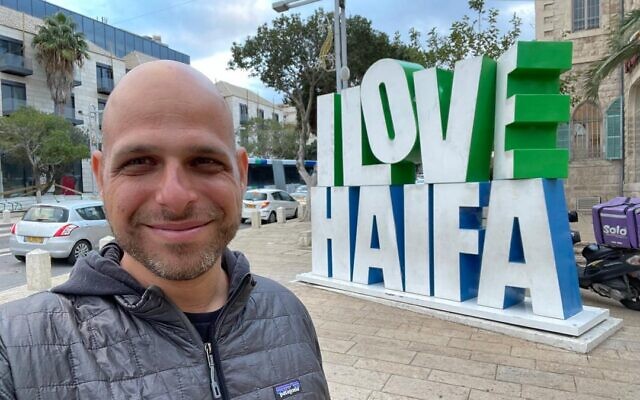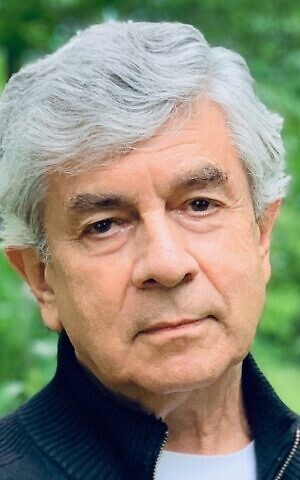Local Israelis Protest Against Proposed Judicial Overhaul
Dozens of Atlantans join thousands in Israel and around the world, including IDF veterans.

The protests in Israel began Jan. 7, a little over a week after the current government, led by Prime Minister Benjamin Netanyahu, was sworn in, and days after his justice minister announced plans to radically alter the country’s judicial system which, according to critics, would lead to the end of democracy there. On Feb. 27, Israelis living in Atlanta launched their own weekly protests in front of the Consulate General of Israel to the Southeast.
“The group came together organically,” explained organizer Dotan Zebrowitz Harpak. “The first week, I thought we’d probably have 10; I hoped for 20. Forty showed up. In the second week, we had over 60. For many of us Israelis we feel like we’re doing something to show solidarity with our friends and family in Israel.”
That Israelis here would protest against their own government was not a foregone conclusion. “This isn’t easy for Israelis to do; it’s never been done before, but it shows how serious we feel, to do it publicly, in the middle of Midtown. It’s very uncomfortable for every Israeli,” said Harpak. “It shows the level of opposition [to the legislation] and the level of commitment.”

Both Harpak, who has lived in Atlanta since 2010, and Israeli Meirav Mayer, who moved here a decade ago for her high-tech job, emphasized that the protests in Atlanta go beyond politics.
“We don’t necessarily share the same politics, either Israeli or American; it goes across religious and political viewpoints,” said Mayer, who says she can’t sleep at night worrying about not only her 19-year-old daughter serving in the Israel Defense Forces, but about the country’s direction.
Mayer, who participated in two weekly protests in Israel earlier this year, said the actions of the current government have reached a new low. “We have never had anything similar to this,” she said, suggesting that Netanyahu is acting on his own personal agenda to keep himself out of prison. He is on trial on several corruption charges. “It’s hard to stop him. He’s not focused on what’s good for the country.”
“We’re not protesting against Israel or the people in the consulate, but what the government is trying to do,” said Harpak, who served in the Israeli army in both Southern Lebanon and in the West Bank.
There are several components of the coalition government’s agenda to change the country’s judiciary branch, including the Supreme Court. One component effectively gives the ruling government full control over judicial appointments by changing the composition of the judicial selection committee. The current structure requires consensus between the government and legal professionals. The proposed plan would also block the Supreme Court from judicial review of legislation passed by a simple majority of the country’s parliament, or Knesset. In Israel, the majority of the 120 seats in the legislative branch is comprised of the ruling executive branch.

Another component of the coalition government’s plan would prohibit the country’s High Court from oversight of ministerial appointments. This proposal is widely seen as an effort to reinstate Shas Party leader Aryeh Deri to his appointed posts as minister of both health and interior ministries. Netanyahu was forced by the court early this year to fire Deri because of previous convictions of fraud.
The coalition government has been fast-tracking its judicial legislation through the Knesset, with some saying the goal is to complete the task by Passover in early April. Both Israeli President Izaac Herzog and those opposed to the agenda of the government have pleaded for a pause in the process so that they could have some input. Netanyahu’s justice minister Yariv Levin and Knesset constitution, law, and justice committee chairman Simcha Rothman have declined to slow the process.
Critics of the government’s judicial overhaul contend that, if passed, Israel would no longer be a democracy.
When asked how long the protests would continue in Atlanta, Harpak said, “I take my cue from the protesters in Israel, and they say that you don’t compromise on half of a democracy. Protesters don’t want compromise.” He added, however, that he feels strongly that the contract between the Israeli people and its government has been “breached.”
I take my cue from the protesters in Israel, and they say that you don’t compromise on half of a democracy. Protesters don’t want compromise.
Another organizer behind the Atlanta protests, Michal Arbilly, explained that, “We are a group of Israeli expats protesting the anti-democratic moves by the Israeli government, aimed at voiding the power of the judiciary and allowing government unchecked power. We do this in solidarity with hundreds of thousands of Israelis protesting in the streets of Israel for weeks now, and we are a part of a movement of expats protesting in 30 cities around the world.”
Of course, not every Israeli in Atlanta wants to protest in front of the Consulate. One Israeli, who did not want to be identified, told the AJT in December that she and a few Israeli friends were “happy” to have Netanyahu lead the government. On March 2, she seemed to change her tune. “I’m not supporting Netanyahu,” calling herself “sad” about the situation in Israel, from which she moved decades ago.
There are many in the Atlanta Jewish community who don’t hold Israeli citizenship but have very strong connections with the country. One of those is Harry Stern, former head of the Marcus Jewish Community Center of Atlanta. He and his wife, Aviva, lived in Israel for six years. He has a daughter who was born there. He speaks regularly with family members and friends in Israel.

According to Stern, if he were in Israel now, he wouldn’t join the approximately 400,000 Israeli protesters on the streets of dozens of cities, but he “would be protesting in different ways.”
Anxious to emphasize his love for the country and lack of desire to criticize it, Stern told the AJT that he disagrees with the current government’s judicial overhaul and feels intense sadness over what is happening there.
“I’m torn. I love Israel with a passion. But when I see Netanyahu calling legitimate protesters ‘anarchists,’ I am wounded by it,” said Stern. He blames Netanyahu also for making a Faustian bargain with ministers Itamar Ben Gvir and Bezalel Smotrich, both of whom he claims are “extraordinary provocateurs leading the country in the wrong direction.”
While emphasizing how “painful it is to hear from friends and family in Israel,” Stern said he’s actually not afraid for Israel’s democracy. “It is so ingrained. I don’t fear for the basic structures of democracy.” But he does “fear for the next months of continued social unrest. The best thing that can happen is for the government to fall and call for new elections. I would really hope for that.”
- News
- Local
- Jan Jaben-Eilon
- Protests
- Israel
- Prime Minister Benjamin Netanyahu
- Consulate General of Israel to the Southeast
- Dotan Zebrowitz Harpak
- Meirav Mayer
- Israel Defense Forces
- West Bank
- Lebanon
- Israeli Supreme Court
- Knesset
- Shas Party leader Aryeh Deri
- President Izaac Herzog
- Justice Minister Yariv Levin
- Simcha Rothman
- Michal Arbilly
- Harry Stern
- Marcus Jewish Community Center of Atlanta
- Itamar Ben-Gvir
- Faustian bargain
- Bezalel Smotrich



comments